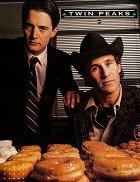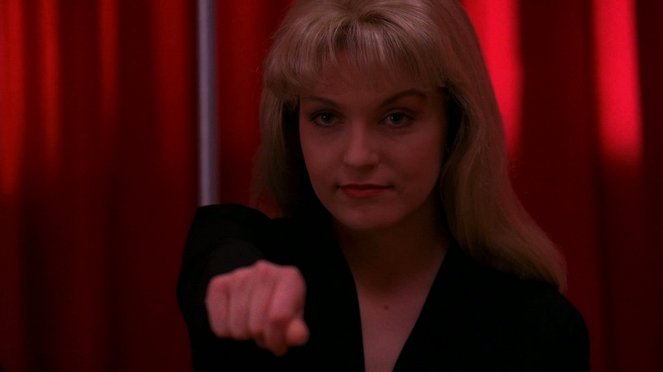Zeneszerző:
Angelo BadalamentiSzereplők:
Kyle MacLachlan, Michael Horse, Mädchen Amick, Dana Ashbrook, Richard Beymer, Sherilyn Fenn, Harry Goaz, Michael Ontkean, Lara Flynn Boyle, Warren Frost (több)Streaming (1)
Évad(3) / Epizódok(48)
-
Season 1 (1990) - 8 epizódok
-
Season 2 (1990) - 22 epizódok
-
The Return (2017) - 18 epizódok
Tartalmak(1)
1989 február 24-én a Washington állambeli kisváros tengerpartján megtalálják a szép középiskolás lány, Laura Palmer holttestét. A gyilkosság felderítésére Twin Peaksbe érkezik Dale Cooper FBI-ügynök. Hamarosan rájön, hogy a kisvárosban senki sem az, akinek látszik, mindenkinek van takargatnivalója. Nyomozása minden idők egyik leghíresebb tévékrimije. David Lynch és Mark Frost alkotta meg a világsikert arató sorozatot, amely kultikus rajongás tárgya lett, és beépült a populáris kultúrába. (HBO Europe)
(több)Felhasználói recenzió gudaulin ehhez a sorozathoz (4)
Twin Peaks (1990)
Twin Peaks was, at one point, something of a revelation for me in the field of TV series, completely turning my view of TV production upside down and introducing me to David Lynch as a top-notch master of the mystery genre. Even though more than 20 years have passed since then, I think this series has not been surpassed, despite the fact that TV production in the United States is currently experiencing a huge boom and the mystery genre is very popular. The most fascinating thing is to watch the transformation of the individual characters and, thanks to the professionalism of the entire team, be carried away by the atmosphere of mystery and anticipated threats. In the second half of the series, especially toward the end, it heads towards distinctly hallucinogenic territory, which Lynch perfected in his mishmash Inland Empire, and so I'm one of those who appreciate the more sober first half. I must also emphasize the atmospheric music, which perfectly evoked the dreamy mysterious atmosphere of the town. Overall impression: 95%.
()
Season 1 (1990) (S01)
At the beginning of the 90s, Twin Peaks was a cultural shock and the first harbinger of the rise of the phenomenon of quality TV dramas. Frost and Lynch came up with the idea of combining the widely used format of soap operas with crime drama, turning all the previous principles of serial practice upside down and proving that television production can be done differently, i.e., cleverly and innovatively. The plot was no longer important to them; the murder of the student was bait for the audience to be lured into the maze of strangely fluctuating serial characters and the maze of relationships of the inhabitants of a strange small town. The success did not rely on the story, but on the characters, with whom the authors entertainingly played. The series gradually adopted elements of sitcoms and began to ironically criticize both genres from which it originated. Lynch was lucky when it came to his collaborators. The mysteriously sounding soundtrack by Angelo Badalamenti became a huge hit and a symbol of the series. Kyle MacLachlan, with his sympathetic talents and malleable acting, had no problem identifying with the philosophy of the series and passionately delivered the famous lines to his invisible secretary, Diane. The beautiful mysterious women with unpredictable behavior added an erotic dimension to Twin Peaks. The characters constantly surprised us. Outwardly positive characters carried the seeds of evil within themselves, unexpectedly showed their dark side, and fascinated us with their corruption. The intricate storytelling with many blind alleys, which did not burden itself with explanations and presenting information on a silver platter, attracted intellectuals to the television, who had previously scorned it. The screenwriters played with the viewers, mystified them, and diverted their attention to details that had no practical importance. Twin Peaks was at the forefront of a process that changed the rules of the game in television production and introduced cinematic aesthetics to it. Its success inspired many other television projects, and traces of Twin Peaks can be found practically everywhere today. The first season suited me perfectly and it was precisely this season that led me to discover the eccentric and crazy Lynch. Overall impression: 95%.
()
Season 2 (1990) (S02)
The second season of Twin Peaks actually started as good as the first, but the 4 stars I'm giving it are actually a compromise. i.e., the result of a process in which I slowly but surely distanced myself from the series in its second half, starting from my initial enthusiasm. Lynch couldn't keep his eccentricity and love for the fantastic in check. Step by step, the surreal elements and trips to another dimension were multiplied. The delicate balance that held the world of Twin Peaks together was disrupted. It was absurd and unsettling from the very beginning - after all, that was the reason why I loved the series. But too much of a good thing is too much, and the last and quite insane episode brought the realization that I as a viewer, and Lynch as the creator, were heading in different directions. Overall impression: 75%.
()
The Return (2017) (S03)
This is not the Dale Cooper that I knew. It's not due to the ravages of time or by how he changed or how he looks. It's something that is definitely not there anymore," says Diana to her former superior, alias director David Lynch, perfectly capturing the problem that many viewers will have with the third season of the famous series. When David tweeted, "Your favorite gum is going to be back in style," he foolishly made a mistake. Not only because he no longer has a monopoly on gum but also because others have taken over the taste of his product and added additional ingredients. The first season perfectly fulfilled the expectations of a more educated younger audience who were no longer interested in old, outdated formats aimed at mass appeal. As a result, the studios could come up with something bolder. Lynch caused a revolution by saying, "Forget the main plot, instead, let's play with the characters and subplots, focus on entertaining games and details." It worked. Twenty years later, new technologies and new distribution methods came along, and so Lynch thought it was time for a new revolution. If I were sarcastic, I would say that he directed the third season of Twin Peaks to infuriate and depress TV viewers, as well as to test the loyalty of his fan club and the strength of the Twin Peaks brand. The latter passed with flying colors, and it was interesting to see how, after the first episode, when it was still unclear what the project would turn into, five-star ratings quickly accumulated. I see the peak of Lynch's work in three titles: the first season of Twin Peaks, Lost Highway, and Mulholland Drive. Of course, they were different, but they had one thing in common: No matter how they worked with mystery, no matter how much they resisted a clear interpretation of their world, the director always counted on the viewer. In the case of Inland Empire, I felt for the first time that Lynch's style and self-centeredness suppressed everything else, and Return seems like a continuation of this trend. In Twin Peaks: The Return, Lynch appears as an experimenter who tests the very boundaries of TV creations. He even gave up on the characters. They appear and disappear for long periods, and the creators don't allow us to develop a relationship with them. Imagine a regular series as a soccer field where characters/players meet and clash. Simply put, they play. Twin Peaks: The Return, Lynch expanded that field to the size of a provincial town. Characters rarely meet in it; they mostly just wander the landscape, and the viewer wanders as well, wondering what the creator is trying to achieve. Unlike the first two seasons, the plot does not focus on exploring the environment of a small town but rather jumps chaotically from the center of New York to Montana, from there to South Dakota, and then to the spaces of another dimension for a change, for dozens of minutes. Time also jumps, and everything takes forever. The largest space is given to a childlike figure without its own will, against which even Mr. Tau is an example of a Hamlet-like complicated character. I have heard it proclaimed that testing seemingly blind paths also has meaning, but I'm not sure if any statistically significant group of viewers will want to undergo this research along with Lynch. The magic of the original Twin Peaks lies in its originality and entertainment value. Return is only original. Certainly, you will find many atmospheric scenes in there that resemble Lynch's famous times. But these are solitaires that stick out in space without any connection. On the other hand, it is certainly not a bad thing that this series was created. It is such an oddity that it will find its audience. After all, the feeling that you can appreciate something that is inaccessible to the masses of primitive consumers is certainly delightful. I would recommend Return to true surrealists and seasoned viewers of alternative media. The average viewer will most likely avoid it. Overall impression: 40%.
()
(kevesebbet)
(több)


